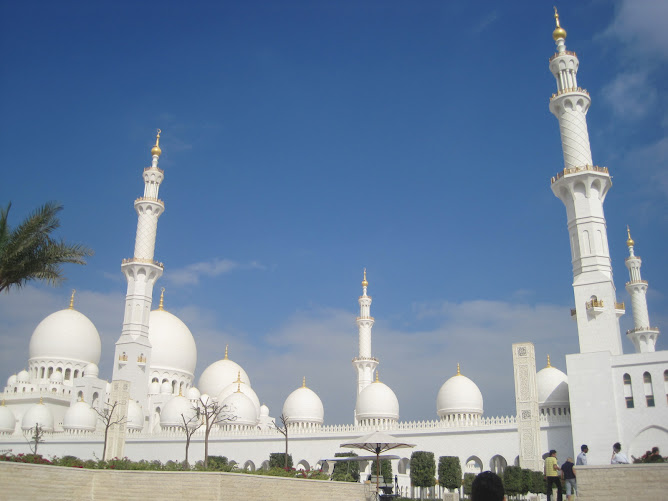

Sheikh Zayed Grand Mosque in Abu Dhabi
I have to admit, when I first entertained the thought of visiting Dubai and Abu Dhabi I imagined the lost city of El Dorado, complete with streets paved with gold and sheikhs betting on camel races. I imagined the demure Arab women in burqas with fabulous and elaborate eye makeup and Gucci shoes peeking out from beneath their floor-length garments. Well, I wasn't entirely wrong.
First things first, of course there was no gold in the streets, but there are plenty of Ferraris, Porsches and Lamborghinis. The men and women mostly wear the same types of clothes that we do, but there are throngs of traditionalists, with men in ghutras (head scarves) and thobes (robes). I didn't see any burqas (head-to-toe body covering where no part of the body, not even eyes, are seen). But there were plenty of ladies in abayas (a loose-fitting neck-to-ankle garment) and hijabs (head scarves). Some of them also wore a niqab that would cover their face and mouth, but not their eyes. Also, the population of Dubai is heavily international. Less than 5 percent of the residents are natives, with the rest of population migrating from as far away as Eastern Europe and Africa to Saudi Arabia, India and Pakistan.
The Royal Radisson was the home base of my Arab adventure. Occupying one of the twin Nassima Towers, the high-rise is a monument to creativity and modernism, evident in its decor and architecture. The view from my 33rd-floor room overlooked Sheikh Zayed Road -- a major artery in the Dubai traffic system. Skyscrapers covered the landscape near and far, but still there were undeveloped areas of desert, complete with a camel race track in the distance.
To appreciate the splendor of Dubai is to first understand the history. There's a reason the city hasn't been on the mainstream radar until the past 10 years. The Emirate of Dubai as we know it didn't exist 50 years ago. Oil was not discovered until 1958, and it was found in the capital of the United Arab Emirates, Abu Dhabi. As recently as 1960, the people of the U.A.E. were riding camels and donkeys, and living in palm-leaf structures. When the oil was discovered under the reign of Sheikh Zayed bin Sultan Al Nahyan, he felt that the wealth not only belonged to him, but to the people of his Emirates. Hailed as the father of the nation, Sheikh Zayed built roads, infrastructure, and began building the bubbling metropolis that exists today. The Emirate of Abu Dhabi has enough oil to last 150 years, while nearby Dubai only has enough to last 2.5 years, which is why it was designed to be more of a tourist attraction--the money needs to come from somewhere.
And it's worked. People from around the globe flock to Dubai to shop, dine and experience a slice of the luxe life. The Emirate of Abu Dhabi is content to blush quietly in Dubai's long shadow of tourism, backstroking in the lucrative oil and gas business. On my trip, I visited both Emirates.